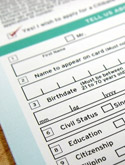If you know much about me, you know that I’m all about checklists, and this beast covers just about everything you can think of when it comes to moving. I’m sure there might be some things that I’ve missed, too. Let me know what you’d add to the list.
This checklist is shared in the format where it can be included on your website. Obviously, it, like the other checklists we’ve shared this week, can be easily adjusted to email to your client individually as well.
Pre-Planning Your Move
Plan your move early, especially if you intend to move during the summer months, which constitute the peak season for movers.
Have the moving company conduct a household goods survey, in order to furnish you with a written estimate; the final cost will depend upon the actual weight of your household goods after they are loaded on the van. The weight on which charges are based is calculated by weighing the van both before and after loading.
Ask the agent about the company’s maximum liability for loss or damage. Check with your insurance company to see if you have a floater policy that covers the move. In order to establish a value of your household goods and personal effects, it is to your advantage to prepare a detailed household inventory, listing all items in each room of your home, including the year of purchase, original cost, and estimated present value.
In the event you are still making payments on any of your household goods or personal effects, discuss the move with your creditors. A lender’s permission is required to remove belongings in which he has an interest.
If you plan to sell your house, get it on the market as soon as possible.
Arrange for a house-hunting trip to your new city. Ask Walter to find you the top agent in any city around the world.
Subscribe to the online Sunday edition of the local newspaper in advance of your move. It usually contains a large real estate section, which can be very helpful in giving you some idea of the type of housing available in the new city, as well as other useful information.
Certain expenses connected with your move may be tax deductible, in which case it is important for you to keep records.
Consider a garage sale to dispose of unwanted items. If you donate clothing or household goods to charitable organizations, get receipts showing their approximate value for tax deductions.
Begin to use up large supplies of canned goods and frozen foods. Buy only what will be used before moving.
Upon Purchase or Lease of Your New Residence
Establish credit in your new city. Ask your banker to refer you to a correspondent bank and act as a credit reference.
Obtain W-2 forms from your former employer or arrange to have them forwarded.
Obtain transcripts of the children’s school records and credentials from the school authorities or arrange to have them transferred.
Gather family and dental records including vaccination data, medical and lens prescriptions, dates of last examinations, history of past illnesses, etc.
Ask your doctor/dentist to recommend colleagues in the new city.
Ask your lawyer to recommend a colleague in your new city.
Obtain letters of introduction from your pastor, organization, club presidents, business associates, etc.
Arrange to sell your country club membership. Transfer or resign memberships in other clubs or associations.
Within Three Weeks Prior to Moving Day
Phone the local business office of the telephone or cable company. They can make arrangements for service in your new home and, upon request, give out your new number when your present number is called.
Contact the utility companies in your new city to establish credit so there will be no delay in service. Some moving companies offer assistance in obtaining their addresses:
Electric
Water
Gas
Fuel
Cable TV/satellite
If possible, arrange to have utilities connected before your arrival.
Make family travel plans. Reserve air or rail transportation and hotel accommodations as needed.
Have your car prepared for the trip: tires, brakes, lubrication, oil change, tune-up, etc., as needed.
If you plan to do the packing yourself, start collecting suitable containers. You can purchase specialized containers from most moving companies, such as:
Wardrobe containers
Small cartons for heavy items (books, record albums, tools, canned goods, etc.)
Medium-sized cartons for bulkier but not so heavy items (towels, linens, small appliances, etc.).
Large cartons for bulky items (pillows, blankets, stuffed toys, etc.).
Special dish and glassware containers
Collect other packing materials:
White paper, tissue paper, paper towels, or unprinted newspaper.
Newspapers (for outer wrapping only).
Strong tape for sealing packed cartons.
Scissors or sharp knife (keep out of children’s reach).
Felt marker for labeling cartons.
Notebook and pencil for listing cartons as they are packed.
Labels or stickers available from your moving company.
Dispose of flammables such as fireworks, cleaning fluids, matches, acids, pressure cans, paint thinner, etc.
Drain oil and fuel from your power mower and other machinery. Discard partly used cans of oil, paint, syrup, or any other substance that may leak.
Carefully tape-seal and place in individual waterproof bags any jars of liquid or semi-liquids you do not wish to discard.
Have rugs cleaned that are to be moved. Leave them rolled and wrapped when they are returned from the cleaners.
If draperies are to be moved, have them cleaned and ready for alterations that might be needed in your new home.
Collect items that are being cleaned, stored, or repaired (clothing, furs, shoes, watches, etc.). Empty your locker at the club, bowling alley, etc.
Return library books and anything borrowed from friends or neighbors. Also, collect things you may have loaned.
Decide what to do with your houseplants. (See our plant moving checklist.)
Set a date with a reliable serviceman to prepare your appliances for shipment, preferably the day before moving. Depending upon the appliance, pre- as well as post-service may be needed for refrigerator, freezer, ranger, washer, dryer, grandfather clock, home theater systems, etc.
Pianos need to be prepared for moving by a specialized technician.
Make arrangements to have your utilities disconnected on moving day.
Electric
Gas
Fuel
Cable TV/Satellite
Take pets to the veterinarian. Most states require health certificates and rabies inoculations. See that identification and rabies tags are securely attached to the pet’s collar.
Arrange for transportation of pets, if going by air. (See our checklist for safely moving your pet into your new home.)
Change of address notification checklist:
Utilities
Electric
Gas
Water
Telephone
Fuel
Trash removal
Professional Services
Doctor
Dentist
CPA
Lawyer
Real estate broker
Stock broker
Insurance Agents
Life
Fire
Auto
Health
Boat
Established Business Accounts
Dry cleaner
Laundry
Bakery
Drug store
Diaper service
Department stores
Water softener service
Service stations
Banks
Finance companies
Automobile agency
Government and Public Offices
Veteran’s administration
State motor vehicle department
Social security administration
State and federal income tax
Publications
Newspapers
Magazines
Professional
Fraternal
Miscellaneous
Relatives and friends
Business associates
Book and record clubs
Schools
Church
Your landlord
Your tenants
Credit Cards
Bank cards
Oil companies
Other cards
Three Days Prior to Moving
Prepare a take-with-me-inventory:
Important Papers
Automobile ownership records
Children’s school records
Insurance policies
Medical and dental records
Other records
Valuables
Jewelry
Silver
Coin or stamp collection
Furs
Cameras
Irreplaceable photos
Other valuables
For the Trip
Suitcases (clothing)
Credit cards
Driver’s license
Sunglasses
Baby’s needs (See our checklist for easing the moving transition for your children.)
Children’s toys (See our checklist for easing the moving transition for your children.)
Picnic lunch and snacks
Beverages
Paper towels
Pre-moistened towels/baby wipes
Pillows and blankets
Pet food, water, and dishes
Internet access hardware
In the Car
Emergency tools
First-aid kit
Flashlight
Fire extinguisher
Litter/trash basket
Road maps
Insurance identification cards
Car registration
Launder all soiled clothing before the day the appliance man is expected.
Empty refrigerator and freezer so they can dry at least 24 hours before the movers arrive. Be sure to defrost and wipe dry, being careful not to overlook the defrost water pan.
Take the telephone directory with you for contacting former doctors, suppliers, etc. and for making out a Christmas card list.
Pack a box for Instant Needs upon Arrival. Mark this box To Be Loaded Last and Unloaded First. Pack each group of items in a separate paper bag and label the bags. Some suggestions:
Cleaning
Soap powder
Sponge
Paper towels
Dish towels
Dish cloth
Kitchen cleanser
Window cleaner
Steel wool pads
Kitchen
Paper plates, cups, napkins
Plastic knives, forks, spoons
Small saucepan
Serving spoons
Snacks
Easy-open cans of pudding
Dry soup mix
Sandwich spreads
Jars of cheese
Packages of crackers
Boxes of dry cereals
Instant coffee, tea, chocolate
Instant creamer, sugar, salt
Bathroom
Towels and face cloths
Toilet tissue
Tissues
Soap, hand lotion, deodorant
Toothbrushes and toothpaste
Miscellaneous
Light bulbs
Flash light
Hammer, screwdriver, pliers, and nails
Aluminum foil
Shelf paper
Trash bags
Children
Coloring books and crayons
A favorite toy or two
Reading materials
Puzzles
The Day Before the Move
When household goods are professionally packed, the packing is usually done the day before the moving. When they finish, be sure to sign the certificate of packing and unpacking, verifying the number of containers they packed.
Point out to the packers any extra fragile items.
Place a big DO NOT LOAD label on any item that you do not want packed.
Place a LOAD LAST label on cartons that you will want first when you arrive.
Follow packer’s instructions, which you will receive beforehand.
Unplug all television sets 24 hours in advance of a mover, so that the set will be at room temperature on moving day. Moving a set in which heat is still retained could cause internal damage.
Be sure water is emptied from your steam iron.
Be on hand when the serviceman arrives to prepare your appliances for shipment.
Inform police department of your move.
On Moving Day
Be on hand when the movers arrive. Otherwise, it is important to let the agent know to whom you have given authority to take your place. Be sure that person knows exactly what to do.
Accompany the van operator through the house as he inspects and tags each piece of furniture with an identifying number. These numbers, along with a description of your goods and their condition at the time of loading, will appear on the inventory.
Be sure that the condition of each item is recorded and that you have a clear understanding with the van operator about what is to be loaded last.
Remain on the premises until all goods are loaded. After making a final tour of the house, to be sure no items have been overlooked, check and sign the inventory. Get a copy from the van operator and keep it.
Approve and sign the combination “Bill of Lading and Freight Bill.” It states the terms and conditions under which your goods are moved and is also your receipt for shipment. Be sure you have completed the “Declared Valuation” statement.
Check to see that the van operator has the exact destination address. Be specific as to where and how you can be reached pending the arrival of your household goods.
Leave a note listing your new address in a conspicuous place in the house so new occupants will be able to forward any of your mail inadvertently delivered to them.
Lock the house and leave the keys with a responsible person or in a pre-arranged location.
Upon Arrival at Your Destination
If you have not yet done so, get in touch with the utility companies and make necessary arrangements for service. Inquire if any of them provide appliance connection service without charge.
Make arrangements for re-installation of appliances.
Be on hand to accept delivery when the movers arrive.
The van operator is obligated by law to receive payment before he can unload your belongings. Payment is required in cash, traveler’s check, money order, or cashier’s check unless other billing arrangements have been made in advance.
Check your household goods as they are unloaded. If there is any change in the condition of the property as noted on the inventory at the time of loading or if any items are missing, note such changes and/or missing items on the van operator’s copy of the Inventory Sheet. You need to personally report any loss or damage to the moving company immediately.
Wait twenty-four hours after moving to turn on your television sets. They need to settle and adjust to temperature differences.
Click here for our other exclusive moving checklists!
Lead generation is what builds your business and keeps your pipeline full, no matter what the market says! Grow Your Leads: Just Add Wa(l)ter is a hefty book full of detailed and complete prospecting systems, and it includes the data CD (digital copy). This is also a great manual for an assistant.
Call 800.792.5837 and ask for the $50 blog special on Grow Your Leads: Just Add Wa(l)ter. Check out the content details here: http://www.waltersanford.com/shop/grow-your-leads-just-ask-walter/.









